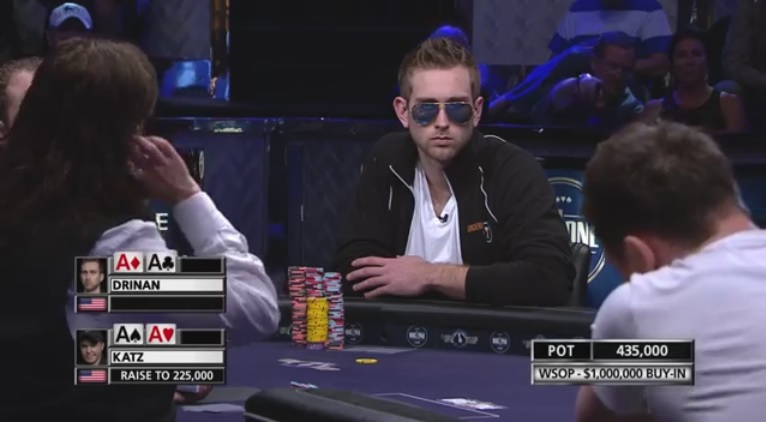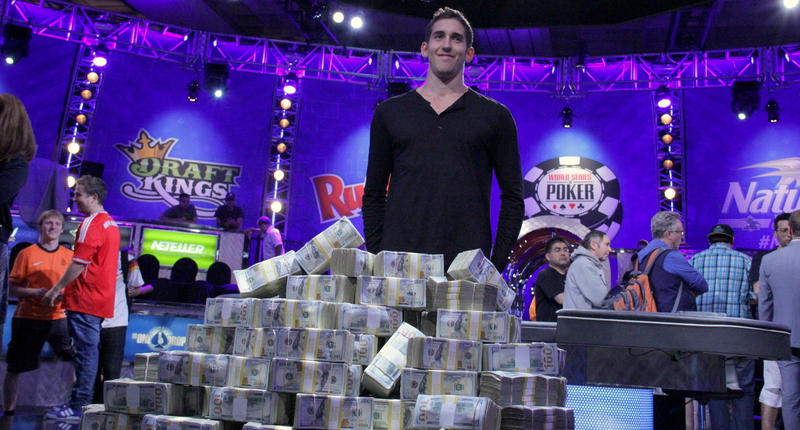Poker Pro On Losing Aces V. Aces In $1M Buy-In: Didn't Quite Feel As Painful As 'The Worst Beat Ever'Connor Drinan Says That Pain Of Losing Brutal Hand Never Really Hit Him |
|
|

Poker pro Connor Drinan grabbed lots of mainstream media attention late last month after video coverage of his elimination hand in the $1 million buy-in at the 2014 WSOP hit airwaves.
Drinan held pocket aces and ran into the pocket aces of Cary Katz. Unfortunately for the 25-year-old Drinan, Katz made a flush on the river to send him to the rail in 18th.
Card Player had the chance to speak to Drinan about a week after his bad beat went viral on the Internet. Drinan spoke about whether it was wrong to label his knockout hand the “worst beat ever,” like some in mainstream sports journalism chose to do.
For what it’s worth, Drinan’s hand might not have been the worst beat ever in the history of $1 million buy-ins at the WSOP. There have been only two such events.
In 2012, Mikhail Smirnov mucked quad eights because he thought his opponent held the exact two cards needed for a straight flush. Smirnov’s opponent never divulged what he had.
Brian Pempus: First off, can you talk about how you found poker and worked your way up in stakes to be able to play a $1m buyin?
Connor Drinan: Sure. I’ve actually been playing poker for a very long time considering my age. I started playing small home games with my track team when I was a freshman in high school and started to do pretty well. I had two knee surgeries that year which was the end of my high school athletic career and this led me to online poker, as I all of the sudden had so much extra free time.
I was 15 started with freeroll tournaments because my mom wouldn’t let me make a deposit with her credit card. After a few months of grinding freerolls I probably accumulated about $50 and was ready for the real money games. I basically moved my bankroll from site to site grinding out deposit bonuses—we used to call it “bonus whoring”—until I had about $3,000 playing mostly limit hold’em.
Then I found sit-and-gos and was a 9-10 max sit-and-go grinder for a while. I started with the $22s and within a few months was playing the highest stakes—$200-$500s. One of the other regs told me I should check out [multi-table tournaments] because I was one of the most aggressive players in the sit-and-gos, and he thought my style would work well for tournaments. I had three $20,000+ scores my first week in tournaments and was instantly hooked. I was still only 16-17, so it was hard to play tournaments full time. I was really only a Sunday only player.
I still tried hard in school because I wasn’t sure I wanted to do poker as a career. I went to Indiana University for business and continued to play pretty much only Sunday tournaments, picking up heads-up sit-and-gos in 2009 so that I had something more flexible I could grind during the week. When Black Friday happened I was a junior at IU and decided to pretty much just quit poker and finish up school with no distractions. I graduated in Dec. 2012 and by Feb. 2013 I was ready to get back on PokerStars.
I was excited to be able to fully dedicate myself to poker for the first time in my life and see what happens. Because I had been out of the game so long I thought it might be a good idea to get staked by someone who was doing well in the current climate and luckily my past reputation was good enough that Calvin “cal42688” Anderson was interested in staking me. It was my first time being staked and our backing relationship lasted through the summer that year, but I went on my own after the 2013 $111,111 One Drop where I satellited in for $5,000 and finished 11th for a little over $300,000. It was a great experience, and I felt very well prepared to play on my own again. Since last summer I’ve just been grinding super hard online. I do well in satellite structured tournaments so I decided to fire the $25,000 satellite into the One Drop again and was fortunate enough to win the entry.
BP: Was it pretty surreal to be playing in that big of a buy-in given what stakes you were playing early on in college?
CD: Yeah, absolutely. The biggest tournament I could win each week online would only pay for 1/5th of the entry fee. So it was pretty crazy to be playing a tournament where the buy-in was bigger than any tournament I’ve ever won.
BP: How much of yourself did you decide to keep for it?
CD: I decided to keep about 10 percent of myself but I had sold and swapped a lot of action for the $25,000 satellite to begin with. It was still a great score for me though.
BP: That aces vs. aces hand you played got so much mainstream media attention. Was the level of attention surprising to you? What do you make of some outlets labeling it the “worst beat ever”?
CD: Yeah, the attention was definitely surprising considering the hand had happened a month prior to the ESPN airing. I figured the bulk of the attention was over but that was silly on my part. I think that on the surface it makes sense why people would say that since it was aces vs. aces in a million dollar buy-in. But given my circumstances and how I had satellited in and profited off the tournament already, it didn’t quite feel as painful as “the worst beat ever” probably should.
BP: Gotcha. I saw a lot of people talk about how well you seemed to take the beat. Were you handling it pretty well on the inside too? Can you talk about how you’ve gained the ability to take variance like that in stride?
CD: Yeah, like I mentioned, I was still feeling fortunate to win the entry to begin with so I couldn’t feel too sorry for myself. I was expecting that it might hit me harder later but thankfully it never did. I was in good enough shape to play the $1,500 mix-max event an hour after busting; granted if it was a regular $1,500 I wouldn’t have. I didn’t want to wake up the next day and be mad at myself that I missed the chance to play six-max and heads-up. I think the ability to handle variance like that just comes from years of experience. Poker, and especially tournament poker, tends to numb you to strong emotions, both high and low. You take enough beats and it doesn’t matter if the buy-in is $100 or $1 million, you have trained yourself to not even feel it and move on. I only get really upset when I make mistakes and tend to not focus on things I cannot control.
BP: How do you think you played in One Drop prior to that hand? Was the tournament pretty good value given the amateurs in the field?
CD: I was quite happy with how I played. I had a really tough table draw on day 1, and I was pretty exhausted from the satellite win the night before and didn’t get much sleep, so my plan for the day was to just play super solid and make it on to day 2. On day 2, I felt amazing and was back to playing my regular game. I also had better table draws, which helped. The only hand I regret my play with was the 10 8
8 hand they aired on TV. Other than that, I felt great. There was definitely a lot of value in the field with the amateurs. The high rake takes away some of that value, but if I was bankrolled I would definitely play it again on my own money.
hand they aired on TV. Other than that, I felt great. There was definitely a lot of value in the field with the amateurs. The high rake takes away some of that value, but if I was bankrolled I would definitely play it again on my own money.
BP: Did you ever worry that playing a $1 million might make it mentally tougher to grind a $100 online tournament?
CD: Nope not at all. When you are a professional you have to treat poker like a business and think about your hourly. I recognize that my ability to grind the lower buy-in online tournaments so well will continue to give me opportunities like the one I had this summer. If I only played really high buy-ins I could easily go broke. It’s nice to be freerolling myself into the bigger stuff by grinding the lower stuff. Eventually something big will click.

CD: In general, I don’t necessarily disagree, but I also think it’s a very blanket statement. For amateurs who can afford to lose and treat it like entertainment, and for professionals who can find some sort of life balance and not let the poker lifestyle turn them into degenerates, it’s definitely not true. But for a lot of people I bet they wish they never found poker, both professionals and amateurs.
BP: Before you found poker, do you think you had the foundation to be able to handle the game well, both emotionally and strategically? In other words, I guess I’m asking if there can be something traced way back that helped give you the ability to find that balance in poker later in life.
CD: I was always very logical as a kid, even at a really young age, but it mostly goes back to the way I was raised. I have fantastic parents, and they did a great job stressing balance to me as I started to find success in poker. As well, because I started poker so young, poker shaped me even more to think logically and be even-keeled. It’s a chicken or the egg type situation that I have often thought about myself. I think I was attracted to poker because of my personality, but poker shaped my personality even more.
